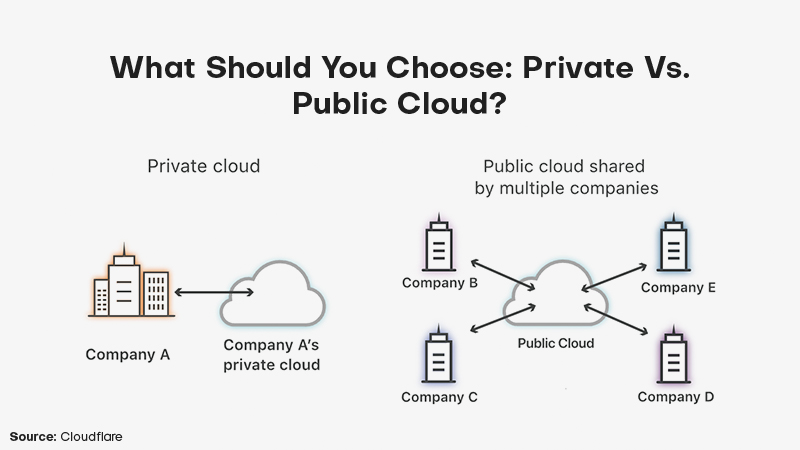The COVID-19 pandemic has further spurred the growth of cloud technology, which has had an enormous rise recently due to rising data storage and security concerns. Each cloud technology – public, private, or hybrid, is growing popular. Recently, MarketsandMarkets predicted that the worldwide cloud computing market will grow at a CAGR of 17.5%, from $371.4 billion in 2020 to $832.1 billion in 2025.
Due to the availability of both private and public clouds, the cloud is varied in its own right. Each cloud architecture is created with a specific goal, providing significant advantages to enterprises. The criteria help industries select a cloud model that meets their needs. Businesses must comprehend the key differences between these two cloud types to choose the appropriate cloud model.
Difference Between Private Cloud and Public Cloud

Private Cloud
Private clouds, often known as data centers, are generally firewall-protected and physically guarded on an organization’s infrastructure. A private cloud is usually created by mature enterprises that have extensively invested in on-premises technology. Private clouds need to be serviced, managed, and eventually upgraded or replaced despite the significant financial gain they provide. Physical security, encryption, network security, and cybersecurity are all within the organization’s direct control in a private cloud. Since the business normally controls private clouds, there is no infrastructure sharing, no multitenancy difficulties, and no delay for local customers and applications.
Advantages
Safety
A company is outsourcing data if it is using cloud computing. As a result, the service provider is solely responsible for the data’s security. Private clouds provide additional protection, making them the perfect choice for large enterprises with sensitive and private data. The information is kept in a secure space just for your company.
Regulation complying
Private cloud computing is the route to go if you are worried about staying in compliance with laws limiting how you utilize confidential material about your clients, employees, or other people. For instance, hosted cloud providers frequently provide the tools and knowledge necessary to support enterprises in upholding their HIPAA and PCI compliance standards.
More Personalization
Public clouds make the same resources and services available to other enterprises. Unless you are ready to pay for the modification, they don’t give many possibilities for personalization. Contrarily, a private cloud is built to be customized, especially to handle workloads from confidential data and proprietary applications.
A company may tailor the cloud to match its specific demands regarding security, accessibility, computation, space, and other factors thanks to managed cloud infrastructure, which was designed for this reason.
Management
Management is seen as one of the key advantages of the private cloud. The firm will have considerably greater authority over its data owing to on-site hardware. This implies that the act of surveillance allows for total control over the data.
Agility
The key factor driving many businesses to the cloud is agility. Users always gain from cloud computing, whether public, private, or hybrid. However, the flexibility is much better in the private cloud scenario. Utilizing a private cloud eliminates any genuine app compatibility problems. In reality, private clouds may be customized to fit the customer’s needs.
Disadvantages
Cost
Private cloud models are costlier from a price perspective. The hardware costs, such as those for servers, network infrastructures, data centers, and software licensing, are a major factor in this. You must also employ a separate on-site crew to care for and manage the cloud. The primary justification for why big businesses frequently want private clouds is this.
Underutilization
The purchased resources may occasionally not be fully used. Consequently, it isn’t easy to maximize the use of all available resources.
Vendor lock-in
When the hardware and infrastructure are leased, this can be a significant barrier to adopting private clouds to prevent the client firm from switching vendors. This kind of service delivery forces it to stick with the current service provider.
Public Cloud
Computing services provided online by independent vendors are referred to as the public cloud. In contrast to private clouds, anybody can use or buy the services offered by public clouds. These services may be provided for free or on a pay-per-use basis, with customers only having to pay for the CPU time, storage space, or bandwidth that they actually use. A cloud service provider with online offerings manages a public cloud. Due to their scalability and adaptability, public clouds effectively satisfy the collaborative demands of today’s global workforce, providing organizations with substantial commercial value. Since the cloud service provider oversees system administration, the public cloud enables organizations to save on acquiring, administering, and maintaining on-premises equipment.
Additionally, they provide flexible bandwidth and scalable RAM, which makes it simpler for enterprises to grow their storage requirements. In a nutshell, public clouds are inexpensive, incredibly scalable, available to everyone, and provide automated data backups.
Advantages
Scalability
You can evolve at an almost unlimited rate using public cloud technologies. In a local data center, this would not be possible. A company may double or even quadruple the quantity of processing and storage to accommodate high demand since allocating resources among clients is made dynamically. As a result, the system’s cost won’t increase significantly, nor will your burden.
Cost
There is no requirement for an IT staff to watch after and keep the system running because third parties offer the public cloud services. The supplier is solely responsible for covering the gear, application, and bandwidth cost. As a result, there is virtually no upfront cost. Secondly, public cloud services employ the pay-as-you-go business model, which implies that payments are paid monthly or annually, depending on how the services are utilized.
Disaster recovery
Deploying a disaster recovery strategy is typically challenging and costly. Because of this, the majority of IT organizations do not take private cloud adoption into account. However, there is a minimal chance of data loss while using public clouds. This is because most cloud service providers maintain several backup systems.
Dependability and flexibility
Peak load adaptation is made simple by public hosting. The user can add or remove resources in accordance with its requirements. This kind of service lessens the difficulty and duration of installation needed for testing and deploying new applications.
Disadvantages
Security
Many organizations are still concerned about the security and privacy of the data stored in public cloud services. Many vendors offer public cloud services, and these services are generally secure. The issue, though, is with the firm and how they plan to use them. Consequently, businesses must employ cyber security procedures. Besides, since they can be located in a foreign nation with different security and privacy laws, one would doubt one’s ability to trust third-party providers.
Little knowledge of the back-end process
There is a chance that critical firm data might be compromised if other parties have access to secret information. The security of applications is the user’s responsibility in the cloud. In addition to likely being in charge of enforcing external firewall rules, the cloud provider is also in charge of physical security. In the public cloud situation, we typically do not know how our data is handled in the back-end or how it is processed to provide the required outcomes.
Customer service
Customer assistance is lacking in public cloud models. In actuality, the customer has a distinct contract. Customer service is something to keep because some companies don’t offer high-quality services. Users must thus find solutions on their own.
Freedom
Although public cloud services are incredibly scalable, there are problems with security and setups. Some public cloud service providers don’t allow users to swap storage options or install OS systems. For enterprises subject to compliance rules, public cloud services are not advised.
So, which one to go for?
Pushing cloud technology to the forefront has been made possible by both private and public clouds. Public clouds stress accessibility, simplicity in setup, and cost, whereas private clouds underscore confidentiality, seclusion, ownership, and personalization. To have more control, security, and privacy, many corporations are now moving their workloads to a private cloud. On a need-by-need basis, the private cloud also offers the possibility of personalized settings.
The public cloud allows small firms that don’t care about exclusive ownership and are accustomed to pay-as-you-go pricing. Businesses may use the public cloud for testing or development reasons, which is a simple use case for the service.
Nevertheless, while selecting an appropriate cloud environment, businesses must consider their IT strategy. The large ones can pick private, the SMBs can use the public cloud approach, or they can select a hybrid model that combines private and public clouds.

